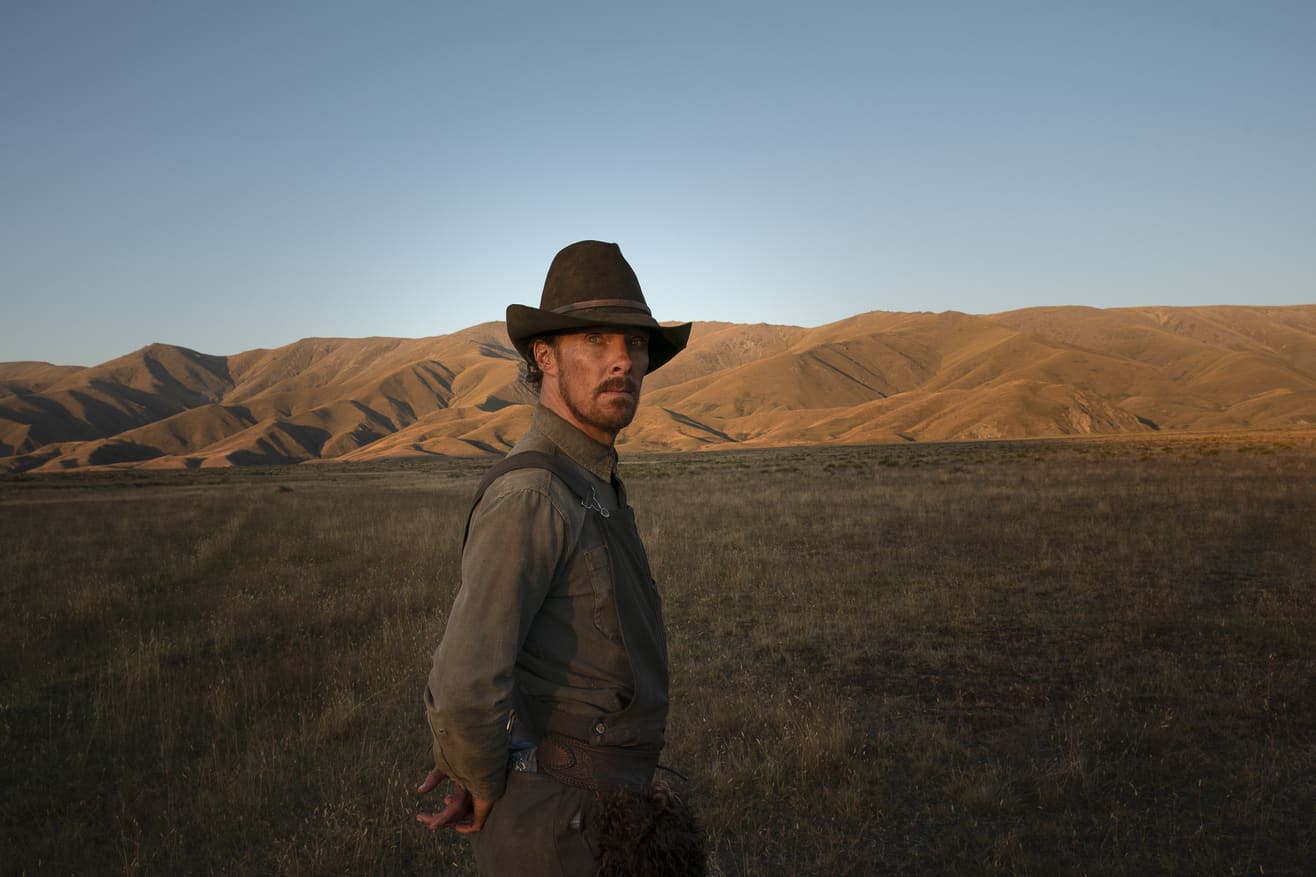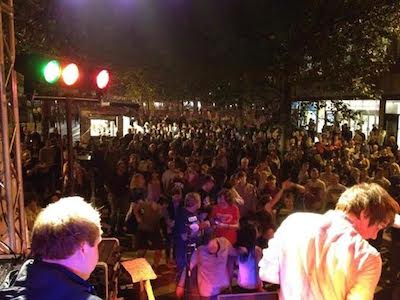Words: Callie Petch
I have now met Mike Leigh. Acclaimed British auteur of such alleged classics as Another Year, Vera Drake, Happy-Go-Lucky, Secrets & Lies, and Naked – the last of which being the only film of his (besides Mr. Turner which I fell asleep during in 2014) I have seen, since we BFI Critics Mentees were assigned to catch the restoration screening of it at the festival as research. I choose to be diplomatic about both Naked and the experience of sitting in a room with Mike Leigh for an hour by invoking that old parental chestnut “if you have nothing nice to say, don’t say anything at all.” Let’s leave that potential anecdote at that.
As mentioned, being under the gun for the Mentorship meant that I wasn’t seeing all that many films for the first week of my time down at London Film Festival and most of the stuff I had managed to see was either kinda fine, somewhat disappointing (even my acclaim for French Dispatch came with the vital note that it’s Wes Anderson’s weakest in a very long time), or I was too fatigued to properly rate. By the time I was entering the middle-run of the fortnight, a minor realisation set in that I was more enjoying my time down here for the socialisation (more on that in a later dispatch) than the movies themselves. When the slate at a film festival lets one down, it does lead to a minor question of FOMO: am I just picking out the wrong movies? Are the properly great ones playing whilst I’m assigned shit like Naked? Are the organisers holding the best until the back-end of the festival? Or has it really just been a necessarily slow year for filmmaking as everyone adjusts to the new production normal and the hold-overs are major disappointments? (That last one is the scuttlebutt I heard around Edgar Wright’s Last Night in Soho, although I can’t personally vouch for its authenticity since I missed the 8am screening.)
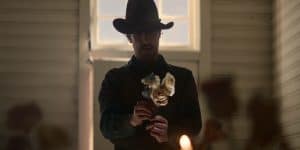
Cr. KIRSTY GRIFFIN/NETFLIX ©2021
Whatever the case may be, it took until the start of Day 6 for me to find something else on the level of Matthew Heineman’s COVID documentary The First Wave. Leave it to Jane Campion, returning from self-imposed feature-film exile for the first time in twelve years, to bring home the goods. Confession: my Jane Campion experience prior to this consisted of just one episode of Top of the Lake. But if The Power of the Dog (Grade: A-) is any indicator of her filmography and storytelling career, that’s an oversight I need to rectify ASAP. Her latest, a psychological Western made for Netflix despite the outstanding vistas and isolating desert-scapes that cinematographer Ari Wegner photographs practically demanding a theatrical experience, treads familiar ground in the realm of revisionist Old West masculinity dramas and does so with a real slow burn. But the devil, and the suffocating atmosphere, is in the unsettling details.
For starters, we’re in 1925 Montana, long after the age of the Wild West is considered done in the country at large yet still reluctantly kicking and screaming its last throes for those plying their trade in the North-West state. Cattle ranching and the caretaking of said ranchers are still the main stock for residents, yet fallow seasons and the gradual encroachment of monied gentry from more prosperous states act as unwelcome reminders of a coming sea change. A motor-car is both a major luxury and an insulting omen. It’s still a harsh unwelcoming life for anybody not traditionally masculine, even less so for the women who must mould themselves into whatever subservient role the men in their lives demand in order to survive, but most of that harshness comes from the cliquey thrashing of those alpha males stubbornly refusing to entertain the concept of any change rather than the environment itself.

Cr. KIRSTY GRIFFIN/NETFLIX © 2021
Into this world we are presented with somebody who believes themselves to be the pole around which everything gravitates, Phil Burbank (Benedict Cumberbatch). Heading up a ranching business with the softer brother he’s largely cowed into submission, George (Jesse Plemons), here is a man determined to make everything and everyone bend to his whim. He’s the revered leader of his posse, famed and awed for his having been tutored by “the greatest rancher who’s ever lived,” Buffalo Bill. He lives and breathes the dirt and the mud and the stench and the festering carcasses of the hides he skins for his own personal collection, bathing naked in a nearby lake rather than in a tub at the rather lavish estate the Burbanks’ wealthier parents have provided. He is cruel and short-tempered, lashing out at the rowdy rich patrons of Rose Gordon’s (Kirsten Dunst) hotel for daring to be jolly in his presence whilst mocking both the widowed Rose and her artistically-inclined teenaged son Peter (Kodi Smit-McPhee) to full-on tears as a means of establishing dominance in the face of his impending irrelevance.
So much undirected and multi-faceted rage flows through Phil in everything he does. Campion’s screenplay, adapted from the 1967 novel by Thomas Savage, affords the character a surprisingly complex and multi-layered interiority without ever threatening to become sympathetic. Phil is at once terrifying and pathetic. So casual in his cruelty and intimidating in his physical presence that he almost never needs to raise his voice in order to chill the blood of everyone in the room. But there’s nonetheless a limit to his power, something he gets made aware of each time somebody or something from outside his frontier bubble bursts its way in. Especially so when George, behind Phil’s back, marries and brings home Rose to the family estate. In these times, Phil reverts to acting like a child. Refusing to bathe for his parents and the high-society governor when they come to visit, crushing Peter’s artfully-constructed paper flowers, mocking Rose’s efforts to re-learn the piano by whistling her flubbed recitals back at her from the top of the stairs over and over again. There’s evidently some repressed trauma fuelling his behaviour and impotency, yet it’s also difficult to discern what the end goal of his behaviour may be since there’s a strong chance even Phil himself doesn’t know.
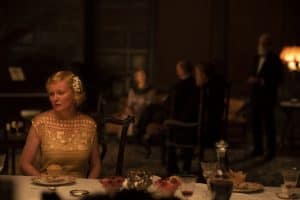
Cr. KIRSTY GRIFFIN/NETFLIX © 2021
He’s fascinating to unpack and is emblematic of Campion’s film at large. The Power of the Dog is fairly minimalist in its narrative and operates at a low simmer, never quite exploding like it constantly threatens to. But that stripped-back set-up gets filled with dense explorations of male entitlement, masculine resentment, control, sexual repression, trauma, class envy and imposter syndrome, the existential threat of obsolescence and how all of those mix together into a toxic cocktail of mundane horror. Make no mistake, a lot is going on here. Even just in the presentation of the Burbank estate. Production designer Grant Major and set decorator Amber Richards dress this quite comfortable-for-the-period two-floor multi-bedroom building in washed out tones, a noticeable-enough coat of dust, and a general sensation of stillness like all of the furniture hasn’t moved since the current tenants first arrived. Combined with Wegner’s wide-angle cinematography making a living room seem cavernous, the staircase an imposing watchtower for Phil over his domain, and bodies moving through it in general looking like foreign presences disturbing the peace, there’s something almost gothic to the place. A house ill-fitting and mentally suffocating to all who pass through its doors.
Such oppressive atmosphere is also built by Jonny Greenwood’s all-timer score. Discordant, arhythmic, often atonal, building up these recurring leitmotifs that are almost mocking in their incessant repetition, and each and every chord sequence never fully resolving until the absolute last sequence of the film. It’s very much in the manner of his breakthrough work on There Will Be Blood, one could argue that The Power of the Dog as a whole is somewhat indebted to that Paul Thomas Anderson movie, although to do so would be to miss the forest for the trees with both Greenwood’s increased expertise in such avant-garde composition and the eventual destination of Campion’s story overall.
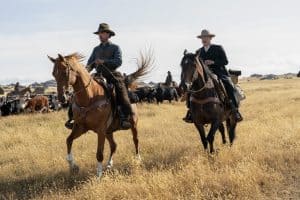
Cr. KIRSTY GRIFFIN/NETFLIX © 2021
To fixate on other modern Westerns would also be doing a disservice to the incredible performances. Cumberbatch hasn’t been this good in a long, long time, toning down his Actor tics for something much subtler and ultimately more effective which convinces totally. Dunst similarly does great work without going overboard, Rose’s heartbreaking descent into alcoholic despair and to-heel fear of Phil’s psychological warfare painting a broken woman struggling to assert some level of control over herself in a world refusing to show her kindness. But the secret ace of the entire thing, especially given the extent to which he does and does not play into the movie’s climax, may actually be Plemons. In George’s interactions with and courtship of Rose, you can see the kindness and ambition that Phil has tried his best to stamp out of him, which are sweet and warm in Plemons’ demeanour. But what Plemons does a phenomenal job with is further teasing out the ways in which George isn’t so different from his brother, the obliviously self-centred ways with which he tries to fashion Rose into a high-society wife capable of witticisms and parlour-trick piano playing in spite of her meek protestations.
There’s something at once hopelessly naïve and inadvertently menacing in the way that George keeps pushing the piano on Rose, blind to the psychological pain its continued presence in the house has on her since he so badly wants to refashion himself as a sophisticated gentleman whose brother can no longer hurt or control him. He’s not actively malicious, there’s not a trace of such in Plemons’ delivery which is at once reassuring and conflict-averse ‘so it shall be,’ but he’s unconsciously exerting his power over someone with even less than he has. As the saying goes, hurt people hurt people and Campion’s film ultimately ends up an exploration of that idea and what happens when someone finally bites back. The Power of the Dog packs a lot into its two hours without ever feeling the need to go melodramatic or break its hypnotic, methodical spell. The results are constantly unsettling and always excellent.
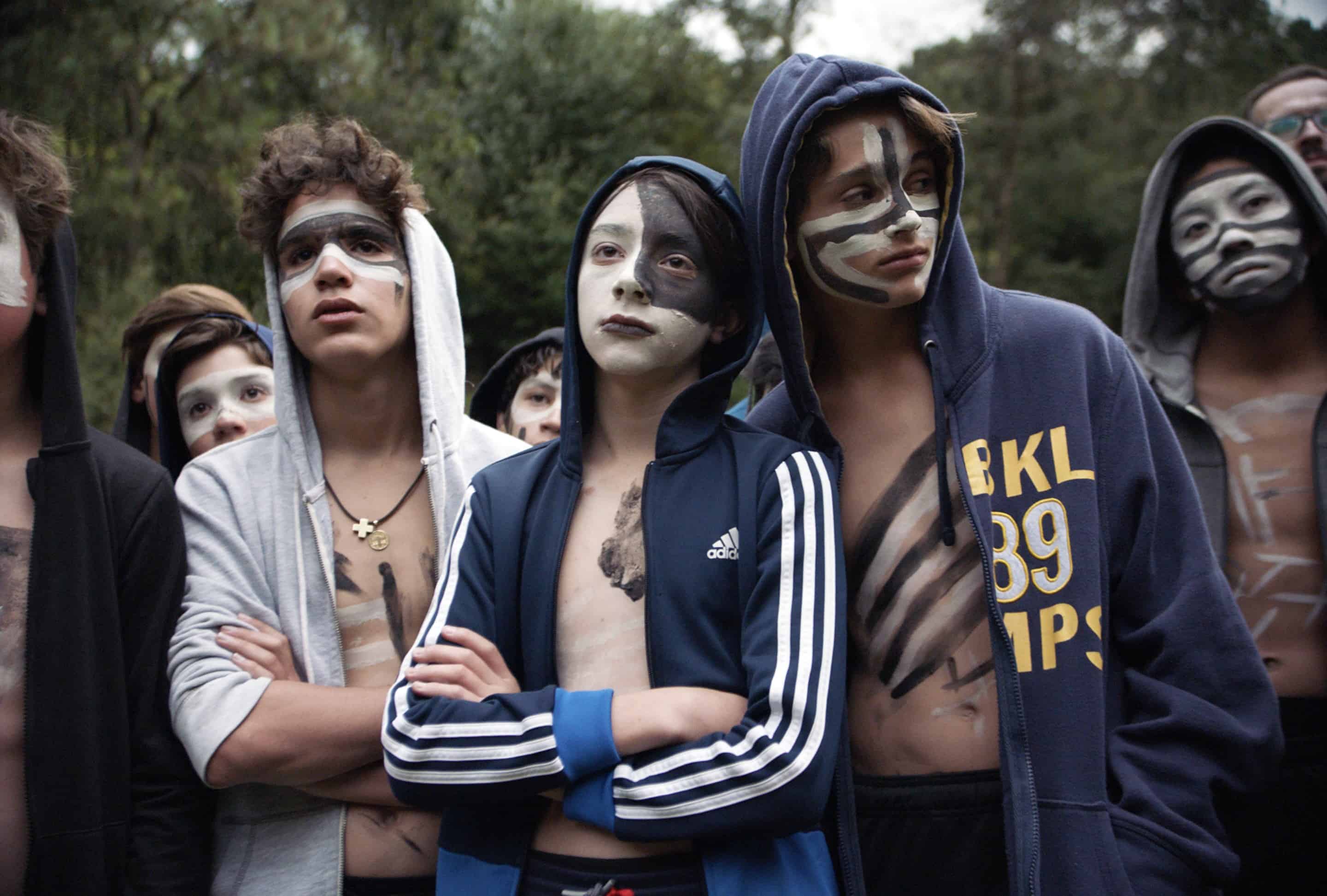 Similarly unsettling and oppressive, though much less effective, is Joaquin del Paso’s The Hole in the Fence (Grade: B-). Set in an exclusive Mexican summer camp for rich Catholic schoolboys, del Paso’s film charts the inevitable sociological breakdown that occurs when a bunch of wealthy, privileged, predominately White or light-skinned, pubescent teenaged boys have all of their worst impulses consistently reinforced by dogmatic adults who take advantage in more ways than one of the closed loop group dynamic. His examinations of religious zealotry are explicitly routed in bigotry and elitism. From the outset of the group’s arrival, they are told how special they are, that they are all leaders of tomorrow, and that the deprived village surrounding this fanciful camp is full of jealous sinners that aren’t worthy of God’s love. Never mind that one of the camp’s kids, in addition to being non-White and possibly gay, comes from a poor town themselves – many of the snobbiest and implied wealthiest kids outwardly resent his “diversity case” status and violently haze him at most every opportunity.
Similarly unsettling and oppressive, though much less effective, is Joaquin del Paso’s The Hole in the Fence (Grade: B-). Set in an exclusive Mexican summer camp for rich Catholic schoolboys, del Paso’s film charts the inevitable sociological breakdown that occurs when a bunch of wealthy, privileged, predominately White or light-skinned, pubescent teenaged boys have all of their worst impulses consistently reinforced by dogmatic adults who take advantage in more ways than one of the closed loop group dynamic. His examinations of religious zealotry are explicitly routed in bigotry and elitism. From the outset of the group’s arrival, they are told how special they are, that they are all leaders of tomorrow, and that the deprived village surrounding this fanciful camp is full of jealous sinners that aren’t worthy of God’s love. Never mind that one of the camp’s kids, in addition to being non-White and possibly gay, comes from a poor town themselves – many of the snobbiest and implied wealthiest kids outwardly resent his “diversity case” status and violently haze him at most every opportunity.
Religion, to this group and in del Paso plus co-writer Lucy Pawlak’s blunt-instrument screenplay, is merely a righteous shield for the monied and protected to do whatever they want to the rest of Mexico. These impressionable youths are certainly no moral crusaders, constantly talking about sex and gleefully bullying with physical aggression, but they’re easily manipulated by the adults entrusted with their care. An ominous hole in the camp’s perimeter fence is used to fuel their fears of the devil and consequently keep the kids under the counsellors’ unquestioned sway, and the Lord of the Flies-esque paranoia the group quickly devolves into is actively stoked rather than abated. These resulting explosions of cruelty can veer a little into uncomfortable emotional exploitation, prolonged scenes of screaming and sobbing children being vile to each other for the very obvious and constantly-hammered home messages of “TOXIC ‘BOYS WILL BE BOYS’ MENTALITY IS BAD” and “RELIGIOUS ZEALOTRY IS BIGOTED AND ALSO BAD.”
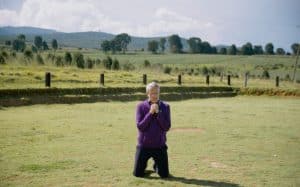 But that’s not to say The Hole in the Fence can’t be effective. It’s most powerful, and therefore horrifying, when it chooses to damn through implication and off-centre framing rather than outright depiction. In particular, the walking red-flag relationship between a creepy medic and a crippled boy never outright states any of its many harrowing implications and is therefore more effective and less exploitative than if they were properly shown. Especially with regards to the last shot of that subplot, del Paso’s direction therefore has a lot in common with Ari Aster. Like, a lot a lot. There’s a similar drone-like score (from Michael Stein & Kyle Dixon) which gets loud and booming, drowning out dialogue at key moments. There’s a similar predilection for ultra-long wide shots with slow push-zooms and heavily-composed blocking that’s very voyeuristic. There’s a similar heavy saturation of the colour scheme in and around the camp as in Midsommar, intended to juxtapose the idyllic nature of these surroundings with the ugliness its participants indulge in. Sometimes, this blatant cribbing works as intended, it’s certainly one foreboding film with an appropriately dispiriting payoff. Other times, it ends up a distraction, as if del Passo is wearing Aster’s filmography like a bear suit.
But that’s not to say The Hole in the Fence can’t be effective. It’s most powerful, and therefore horrifying, when it chooses to damn through implication and off-centre framing rather than outright depiction. In particular, the walking red-flag relationship between a creepy medic and a crippled boy never outright states any of its many harrowing implications and is therefore more effective and less exploitative than if they were properly shown. Especially with regards to the last shot of that subplot, del Paso’s direction therefore has a lot in common with Ari Aster. Like, a lot a lot. There’s a similar drone-like score (from Michael Stein & Kyle Dixon) which gets loud and booming, drowning out dialogue at key moments. There’s a similar predilection for ultra-long wide shots with slow push-zooms and heavily-composed blocking that’s very voyeuristic. There’s a similar heavy saturation of the colour scheme in and around the camp as in Midsommar, intended to juxtapose the idyllic nature of these surroundings with the ugliness its participants indulge in. Sometimes, this blatant cribbing works as intended, it’s certainly one foreboding film with an appropriately dispiriting payoff. Other times, it ends up a distraction, as if del Passo is wearing Aster’s filmography like a bear suit.
Let’s talk about something on the polar opposite end of the emotional intensity spectrum. Britain loves themselves the story of an underdog. Especially when it comes to sporting stories, there’s nothing more British than rooting for the homegrown hero in spite of their likely naffness – consequently the only thing more British than that is immediately turning on said heroes the second they start consistently winning and smearing their personalities with hateful rhetoric (coughcoughLewisHamiltoncough). Perhaps it’s reflective of our shared national self-image, a “patriotic” insecurity that our former-empire nation is under siege from this changing world and we need to reassert our dominance in the face of developing nations by cosplaying as David against new Goliaths. Perhaps it’s because such stories also inevitably have a proudly working-class undercurrent to them, all about sticking it to snobby Etonian gatekeeping types by insurgently occupying traditionally upper-class spaces as a sign that upward mobility in our rigid class system is possible. Or perhaps it’s because such stories have a comforting time-tested structure and star protagonists with eminently rootable self-belief we can all aspire to even if we’re shit.
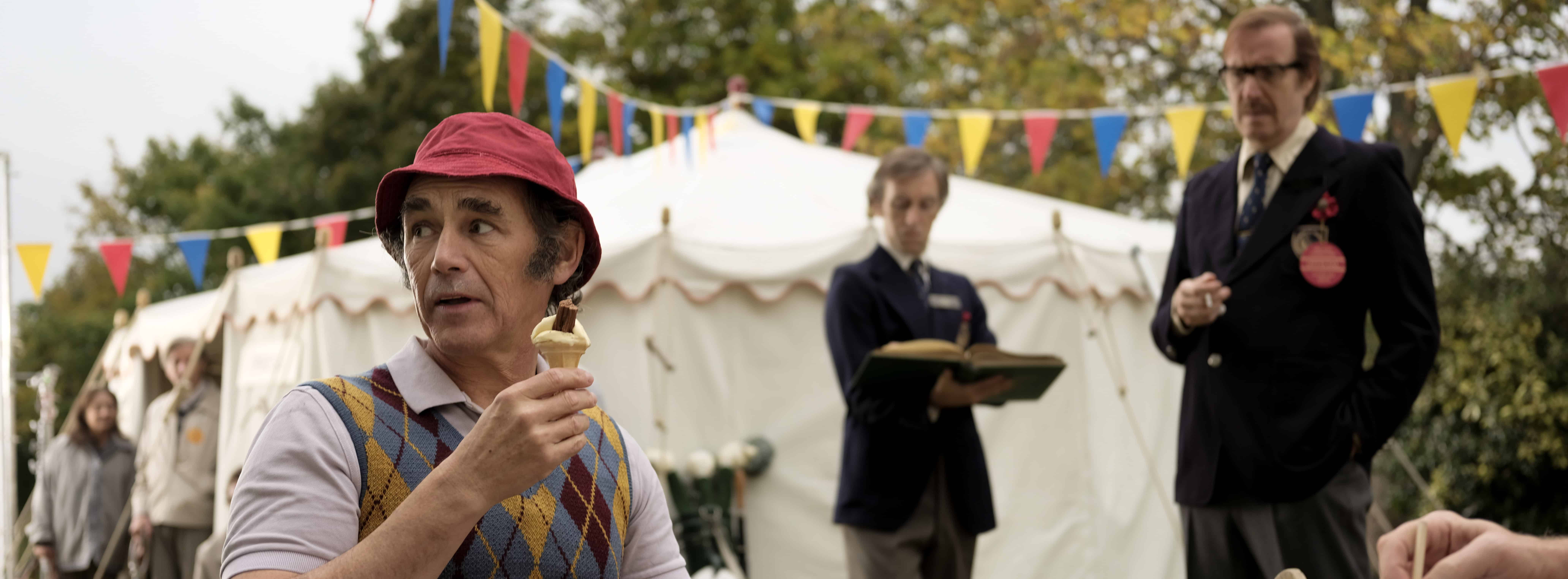 All of these and more are at least passingly represented in Craig Roberts’ The Phantom of the Open (Grade: B-), an Eddie the Eagle for golf enthusiasts. Based on a true story, as these so often are, Maurice Flitcroft (Mark Rylance) is a middle-aged shipyard crane-operator from Cumbria’s own Barrow-in-Furness who, having put all of his life’s dreams on hold for thirty years to provide for his wife Jean (Sally Hawkins) and three sons (Jake Davies, Christian and Jonah Lees), now faces possible redundancy as a nationalisation merger kicks in. Jean, the ever-loving and supportive light that wives so often are in films like these, encourages Maurice to consider chasing his own dreams after decades of trying to let the kids realise theirs, which is when, on the family’s brand-new television set, he becomes enraptured by a golf tournament. The very next day, he sets out to become a professional golfer with dreams of playing at the British Open in spite of financial barriers, the British golfing organisation’s impertinent attitudes towards the working class – headed up by Rhys Ifans’ Looney Tunes-esque baddie Lambert – and his own distinctly sub-par skills.
All of these and more are at least passingly represented in Craig Roberts’ The Phantom of the Open (Grade: B-), an Eddie the Eagle for golf enthusiasts. Based on a true story, as these so often are, Maurice Flitcroft (Mark Rylance) is a middle-aged shipyard crane-operator from Cumbria’s own Barrow-in-Furness who, having put all of his life’s dreams on hold for thirty years to provide for his wife Jean (Sally Hawkins) and three sons (Jake Davies, Christian and Jonah Lees), now faces possible redundancy as a nationalisation merger kicks in. Jean, the ever-loving and supportive light that wives so often are in films like these, encourages Maurice to consider chasing his own dreams after decades of trying to let the kids realise theirs, which is when, on the family’s brand-new television set, he becomes enraptured by a golf tournament. The very next day, he sets out to become a professional golfer with dreams of playing at the British Open in spite of financial barriers, the British golfing organisation’s impertinent attitudes towards the working class – headed up by Rhys Ifans’ Looney Tunes-esque baddie Lambert – and his own distinctly sub-par skills.
It’s very much a what-you-see-is-what-you-get movie with the minor caveat that Maurice never does manage to become an even-passable golfer, despite what decades of such underdog sports movies might have you expecting. There’s a potentially incisive thread running throughout the second half about how we as a society, and in particular the tabloid media which drives much of what our country considers socially acceptable, treat people like Maurice Flitcroft; earnest dreamers who try really hard yet forever come up short due to both their own ineptitudes and circumstances beyond their control. The crucial difference between cruelly mocking such people as novelty dancing monkeys, and sincerely celebrating their efforts and what that near-unbreakable resolve can meaningfully inspire in its own roundabout way. Whilst the film’s narrative never fully explores that angle, Roberts’ direction and the overall vibe of the screenplay by Simon Farnaby – of Paddington and his own biography about Flitcroft on which the film is based – provide a suitable enough answer. Laughing with Maurice as much as they do at him, and affording him grace and dignity which tabloid rags wouldn’t. (Although it is weird to see a reporter for The Sun portrayed as one of the good guys.)
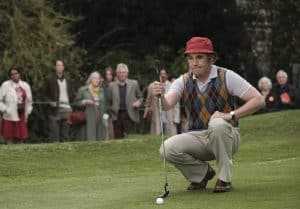 As that Farnaby Paddington DNA should insinuate, Phantom is a very sweet film, sweeter than a tea with six sugars. Rylance is in full-blown lovable doddery grandpa mode and his total commitment to that earnest charm is a key factor in why this film works as well as it does. The hare-brained schemes by which Maurice keeps attempting to return to the British Open in spite of getting a lifetime ban following his record-setting 1976 loophole-abusing debut are delightfully goofy, and the moments where his working-class Northerner roots burst through in unexpected profanity are genuinely funny due to Rylance’s delivery. Even the fact that Rylance is 15 years older than Flitcroft was when he first started golfing adds to the character, playing up his unlikely nature and slightly-heedless chancer charisma.
As that Farnaby Paddington DNA should insinuate, Phantom is a very sweet film, sweeter than a tea with six sugars. Rylance is in full-blown lovable doddery grandpa mode and his total commitment to that earnest charm is a key factor in why this film works as well as it does. The hare-brained schemes by which Maurice keeps attempting to return to the British Open in spite of getting a lifetime ban following his record-setting 1976 loophole-abusing debut are delightfully goofy, and the moments where his working-class Northerner roots burst through in unexpected profanity are genuinely funny due to Rylance’s delivery. Even the fact that Rylance is 15 years older than Flitcroft was when he first started golfing adds to the character, playing up his unlikely nature and slightly-heedless chancer charisma.
It’s a crowdpleaser, albeit one without the control or good taste the Paddington movies and Paul King displayed in keeping things from ever dipping over into noxious levels of cheese. The constant jukebox soundtrack of Northern Soul classics is much too cute by half. The production design of mid-70s North England more resembles Coronation Street than a believable nowhere industrial town. Roberts, for his part, is desperate to show off his bag of style tricks, and chiefly his infatuation with whip-pans, but they only end up coming on much too strong and actively distract and annoy. This hyper-stylisation gets consigned to the montages whilst the rest of the movie is shot in a non-descript British family comedy way, unlike Paul King’s Paddington work where such presentation decisions are applied for the whole thing.
Still, even though there are times where things threaten to turn a little smug and the whole is rather insubstantial and played out, I cannot deny that The Phantom of the Open managed to win me over to its charms. At its best, it really does tap into that wholesome niceness the Paddington movies so expertly propagate and the climax is surprisingly moving, although one could argue that putting a pair of big summing-up-the-film monologues in the hands of Mark Rylance and Sally Hawkins is quite frankly cheating in that regard. There’s a much less complicated and politically-charged reason why we Brits keep returning to underdog sports stories: when they’re done well, they’re just so easy to enjoy.
Next time: two very different movies by two very different returning directors from 2016’s LFF cursed with two very similar titles; Terrence Davies’ biopic of Siegfried Sassoon, Benediction, and Paul Verhoeven’s lesbian nun drama, Benedetta.

